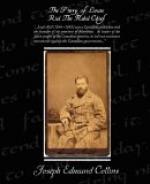So the rebels posted themselves in the woods, and filled a sturdily built house near by, waiting for the approach of Major Crosier and his force. At last they were seen out upon the cold snow-covered prairie. A wild shout went up from the inmates of the house, and it was answered from tree to tree through all the wintry wood. In the exuberance of his delight, one Indian would yelp like a hungry wolf who sighted his prey; and another would hoot like an owl in the middle of the night. At last the police and civilians were close at hand. The meeting took place in a hollow. Beyond was the dim illimitable prairie, on either hand were clumps of naked, dismal poplar, and clusters of white oak. Snow was everywhere, and when a man moved the crunching of the crust could be heard far upon the chill air.
Signals were made for a parley, when some of the men from each side approached the line of demarcation. Joe McKay was the interpreter, and while he was speaking, an Indian, named Little Chief, grabbed at his revolver and tried to wrest it from him. A struggle ensued in which the Indian was worsted. Then raising his weapon McKay fired at the red skin, who dropped dead. This was the signal for battle. The voice of Dumont could be heard ringing through the hollow and over the hills. With perfect regularity his force spread out over a commanding bluff. Each man threw himself flat upon the ground, either shielding his body in the deep snow, or getting behind a tree or boulder. Major Crozier’s force then drew their sleds across the trail, and the police threw themselves down behind it. Then came the words “Begin, my men,” from the commander; —and immediately the crackle of rifles startled the hush of the wilderness. The police were lying down, yet they were not completely sheltered; but the civilians were standing.
“My God, I’m shot,” said one, and he fell upon the snow, not moving again. Then, with a cry, another fell, and another. From the woods on every hand came the whistling shot, and the rushing slugs of the rebels. Every tree had behind it a rebel, with deadly aim. But the murderous bullets seemed to come out of the inanimate wilderness, for not no much as the hand that pulled the deadly trigger could be seen. The police had a mountain gun, which Major Crozier now ordered them to bring to bear on the rebels, but the policeman who loaded it was so confused that he put the lead in before the powder. In forty minutes the bloody fray was ended. Seven of the loyalists were dead in their blood upon the snow, two lay dying, eleven others were wounded and bleeding profusely, Then came the word to retire, when the Major’s force drew off. From the bluff and out of all the woods now came diabolical yells and jeering shouts. The day belonged to the rebels.
When the police had moved away, the Indians and half-breeds came out from their ambush and began to hold rejoicings over the dead. They kicked the bodies, and then began to plunder them, getting, among other booty, two gold watches. Two of the fallen loyalists they observed still breathed, and these they shot through the head. So closely did they hold the muzzles of their murderous guns that the victims’ faces were afterwards found discoloured with powder.




